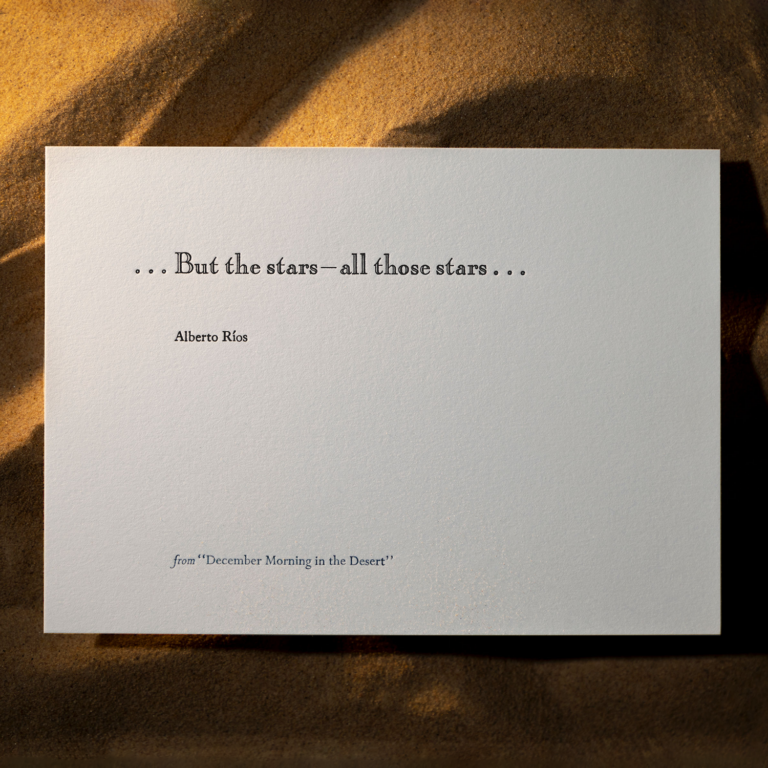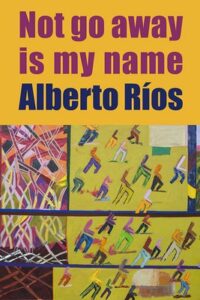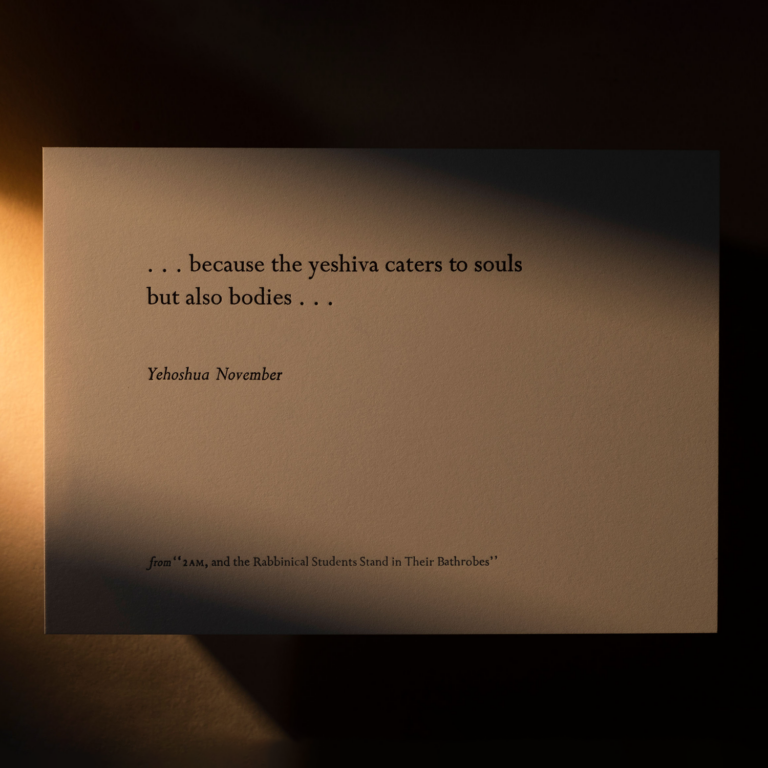Alberto Ríos
December Morning in the Desert
Standing at the edge of a desert, surveying the stars on a December morning, the speaker in this poem observes the everything of everything. He is so small; the universe is so loud and so silent. Thinking about the enormity of all this, he thinks of the smallness of the hearts of birds, wasps, moths, bats, and dragonflies — all flying things around him, suspended in space, like the earth is suspended in space. His own heart, too, echoes the universe’s noise.

Letterpress prints by Myrna Keliher | Photography by Lucero Torres
Guest

Alberto Ríos is Arizona’s inaugural poet laureate and a recent chancellor of the Academy of American Poets, as well as the author of twelve collections of poetry, most recently, Not Go Away Is My Name. Published in the New Yorker, Paris Review, Ploughshares, and other journals, he has also written three short story collections and a memoir, Capirotada, about growing up on the Mexican border. Ríos is also the host of the PBS programs Art in the 48 and Books & Co. University Professor of Letters, Regents’ Professor, Virginia G. Piper Chair in Creative Writing, and the Katharine C. Turner Chair in English, Ríos has taught at Arizona State University since 1982.
Transcript
[music: “Praise the Rain” by Gautam Srikishan]
Pádraig Ó Tuama: My name is Pádraig Ó Tuama, and when I was 13, I wrote a love poem to the stars. I showed it to my English teacher, and she said, No, you can’t be in love with the stars. You have to be in love with a person. And she’d gone through with a red pen and corrected the entire poem. And I went back and undid all of her corrections, because for me, being in love with the stars, being in love with the unknowability of the universe, was a way of feeling at the edge of myself, of feeling tiny in the face of the unknown. And for me, that edge was like the edge of being alive.
[music: “Praise the Rain” by Gautam Srikishan]
“December Morning in the Desert,” by Alberto Ríos:
“The morning is clouded and the birds are hunched,
More cold than hungry, more numb than loud,
This crisp, Arizona shore, where desert meets
The coming edge of the winter world.
It is a cold news in stark announcement,
The myriad stars making bright the black,
As if the sky itself had been snowed upon.
But the stars—all those stars,
Where does the sure noise of their hard work go?
These plugs sparking the motor of an otherwise quiet sky,
Their flickering work everywhere in a white vastness:
We should hear the stars as a great roar
Gathered from the moving of their billion parts, this great
Hot rod skid of the Milky Way across the asphalt night,
The assembled, moving glints and far-floating embers
Risen from the hearth-fires of so many other worlds.
Where does the noise of it all go
If not into the ears, then hearts of the birds all around us,
Their hearts beating so fast and their equally fast
Wings and high songs,
And the bees, too, with their lumbering hum,
And the wasps and moths, the bats, the dragonflies—
None of them sure if any of this is going to work,
This universe—we humans oblivious,
Drinking coffee, not quite awake, calm and moving
Into the slippers of our Monday mornings,
Shivering because, we think,
It’s a little cold out there.”
[music: “At Dusk” by Gautam Srikishan]
So I love the setting of this poem. You know, it’s a poem that starts by being located in the corner of a desert. And then it goes to vast galaxies and the working and the noise and the energy and the heat of stars. And then it returns to the hearts of birds and other flying things, and then it moves into a person on a December morning, not quite awake
And I love the movement of location and the attention that’s drawn to the different experiences of space, everything from the Milky Way to feet going into slippers. Such an extraordinary contrast that’s happening in this poem, moving between vast unknowability and unexplored areas, down into the everyday and the domestic. And I think that’s a beautiful posture to take.
And strangely, while this poem opens up huge questions about the meaning of it all, and, will this universe work? — there’s a deep sense of warmth and comfort in it, too. Sometimes that’s used as a piece of irony, but also, I think there’s a message in this poem to say that small moments of domestic comforts might be the very way where we can pose huge questions about the vast unknowability of the universe.
[music: “Town Market” by Blue Dot Sessions]
You know, there’s a variety of questions that arise for me, when I read this poem. First thing, I think, is that in this poem, which is a poem about the noise, the industry, of the stars and the universe, in a certain sense this poem, too, rises to a gorgeous crescendo, almost like an orchestra. The strength and the demand of the words that he places next to each other asks us, I think, when we read this poem out loud, it asks us to engage in a little bit of noisemaking ourself
And that word “noise” is so interesting. Why does he wonder about the noise of stars? You know, like they’re part of an electrical plant. And then, also, why does he ask the same question, about noise, about the flying things? He has that lovely list — “And the bees, too, with their lumbering hum, / And the wasps and moths, the bats, the dragonflies.” They make their noises, too, the “lumbering hum,” and as do we — in our poems, in our questions, or in our cars, or in our conversation.
You might’ve learned about onomatopoeia when you were studying poetry in school. The word “buzz,” for instance, is onomatopoeia, because the word sounds like the thing that it’s describing. And the “lumbering hum[s]” of the bees is a little echo of onomatopoeia in this poem, a lovely, small domesticity of affection toward the sound that a bee might make.
There’s this noise of being alive that’s at the heart of this poem, a hum of electricity and movement and hearts. And that is something that Alberto Ríos uses so well in this poem, to link the aliveness of being a star with the aliveness of being human with the aliveness of being a dragonfly, and the noise and energy of being a star and the noise and energy of being a human and the noise and energy of being a dragonfly or a wasp or a moth or a bat.
[music: “At Dusk” by Gautam Srikishan]
Alberto Ríos in this poem creates orders of scale that are in kind of contrast with each other. You know, there’s a person, and then there’s the Milky Way. There’s a star, and there’s a corner of the desert. There’s this huge sky, and the whole season, and a dragonfly, and a huge question. And there’s the way within which the sounds of the stars might work its way through the years, into the hearts of a bird. And then there’s us humans, oblivious, with our cups of coffee. And so there’s ways within which he is moving, not only in landscape but in scale, as well, back and forth between tiny and ungraspable. And I think that’s such an interesting contrast that he’s doing.
And strangely, by doing that, he’s creating a way where we’re looking with wonder. One of the phrases that I love most in Irish is “ábhar le hionadh” — to watch with wonder. It’s a way that you can say “curiosity,” but it’s also a posture of being “ábhar le hionadh,” to watch with wonder. And when I read this poem of Alberto Ríos, I’m brought into the experience of watching with wonder, from the domesticity of whatever a Monday morning routine is in a December, to the huge questions that occur to you when you’re looking at a big sky and the oncoming of a season, and you’re in a location where you can see the Earth and consider the fact that the Earth is just one planet amidst a huge galaxy of many planets, all spinning around.
There is all kinds of levels where the enormous question of, how does this work? what does it mean? and is there any meaning? — he locates that in the warmth of a cup of coffee. He makes a little dig at the obliviousness of human beings, but he’s also, I think, perhaps implying in this poem that we perhaps need a small bit of obliviousness, in order to be able to continue on with the everyday things of life. And perhaps that small obliviousness is something that helps us focus on the here and now, which means we can house these questions about the inner universe and the outer universe in this home of a body that we are.
[music: “At Dusk” by Gautam Srikishan]
In this poem, Alberto Ríos is speaking about these flying things and saying that none of them are sure “if any of this is going to work.” And the question is, is any of what? The experiment of being? And that’s one of the things that I think is really interesting, is that he locates humans and questions and dragonflies all together in this unsurety about whether any of this is going to work.
And underneath all of that is the question of, are we alone amongst the galaxies? Who else is there, trying to keep warm and considering that the vast outsideness of everything is cold? There’s a lovely contrast throughout this whole poem, of considering warmth and coldness. At the start, he suggests that the birds are more cold than hungry, and then he’s speaking about the “coming edge of the winter world” and “cold news in stark announcement.” And then there’s these images of warmth — the hearts of the birds all around us and “Risen from the hearth-fires of so many other worlds,” and the mention of the extraordinary heat of the stars, the plugs that spark the motor, and even the Milky Way, the “Hot rod skid of the Milky Way,” and the coffee, too, and the slippers. And somehow, each image of warmth brings it back into the idea, to say that warmth is what sparks the energy of being alive, and therefore, we are part of the everything that’s alive.
There’s an agnosticism at the heart of this poem, and in the middle of the agnosticism, in the middle of not knowing, there is a profound recognition about what does it mean to live with a question. And I think this is the deep invitation of this poem, is to allow ourselves to be on the edge, the edge between the everyday things we do, as well as these huge questions, and to locate ourselves on the edge, there, in our slippers, looking out a window, looking out an open door, early in the morning or late at night, locating ourselves in the midst of the enormity of the everything, wondering, how does this work? Is it going to continue? — but doing that in a way where we are being brought into the magnificence of wonder and the orchestral sound of what it means for this universe, with all its energy and noise, to continue on being, and to recognize that we, too, whether we understand why or not, or how or not, that we, too, are part of that great noise of being.
[music: “Town Market” by Blue Dot Sessions]
“December Morning in the Desert,” by Alberto Ríos:
“The morning is clouded and the birds are hunched,
More cold than hungry, more numb than loud,
This crisp, Arizona shore, where desert meets
The coming edge of the winter world.
It is a cold news in stark announcement,
The myriad stars making bright the black,
As if the sky itself had been snowed upon.
But the stars—all those stars,
Where does the sure noise of their hard work go?
These plugs sparking the motor of an otherwise quiet sky,
Their flickering work everywhere in a white vastness:
We should hear the stars as a great roar
Gathered from the moving of their billion parts, this great
Hot rod skid of the Milky Way across the asphalt night,
The assembled, moving glints and far-floating embers
Risen from the hearth-fires of so many other worlds.
Where does the noise of it all go
If not into the ears, then hearts of the birds all around us,
Their hearts beating so fast and their equally fast
Wings and high songs,
And the bees, too, with their lumbering hum,
And the wasps and moths, the bats, the dragonflies—
None of them sure if any of this is going to work,
This universe—we humans oblivious,
Drinking coffee, not quite awake, calm and moving
Into the slippers of our Monday mornings,
Shivering because, we think,
It’s a little cold out there.”
[music: “Praise the Rain” by Gautam Srikishan]
Chris Heagle: “December Morning in the Desert” comes from Alberto Ríos’s book Not Go Away Is My Name. Thank you to Copper Canyon Press, who gave us permission to use Alberto’s poem. Read it on our website, at onbeing.org.
[music: “Praise the Rain” by Gautam Srikishan]
Poetry Unbound is: Gautam Srikishan, Erin Colasacco, Eddie Gonzalez, Lilian Vo, and me, Chris Heagle.
Our music is composed and provided by Gautam Srikishan and Blue Dot Sessions.
This podcast is produced by On Being Studios, which is located on Dakota land. We also produce other podcasts you might enjoy, like On Being with Krista Tippett, Becoming Wise, and This Movie Changed Me. Find those wherever you like to listen, or visit us at onbeing.org to find out more.
Books & Music
Recommended Reading
The On Being Project is an affiliate partner of Bookshop.org and Amazon.com. Any earnings we receive through these affiliate partnerships go into directly supporting The On Being Project.







